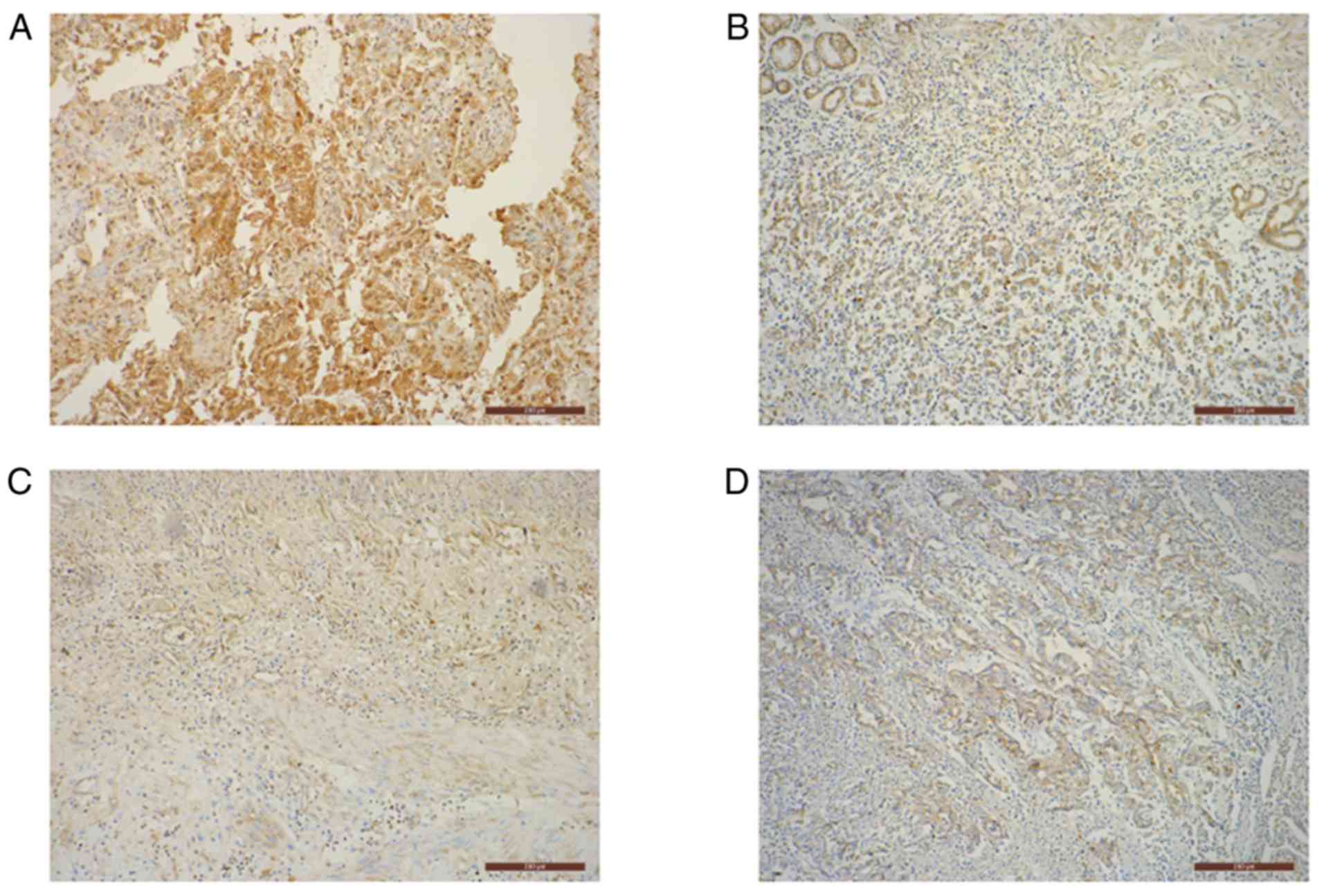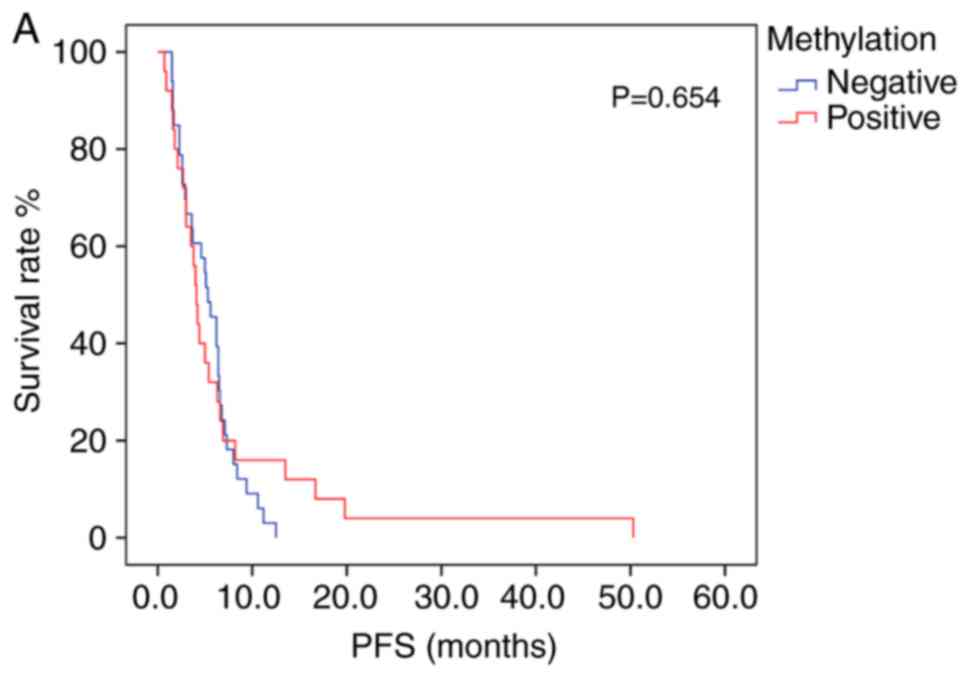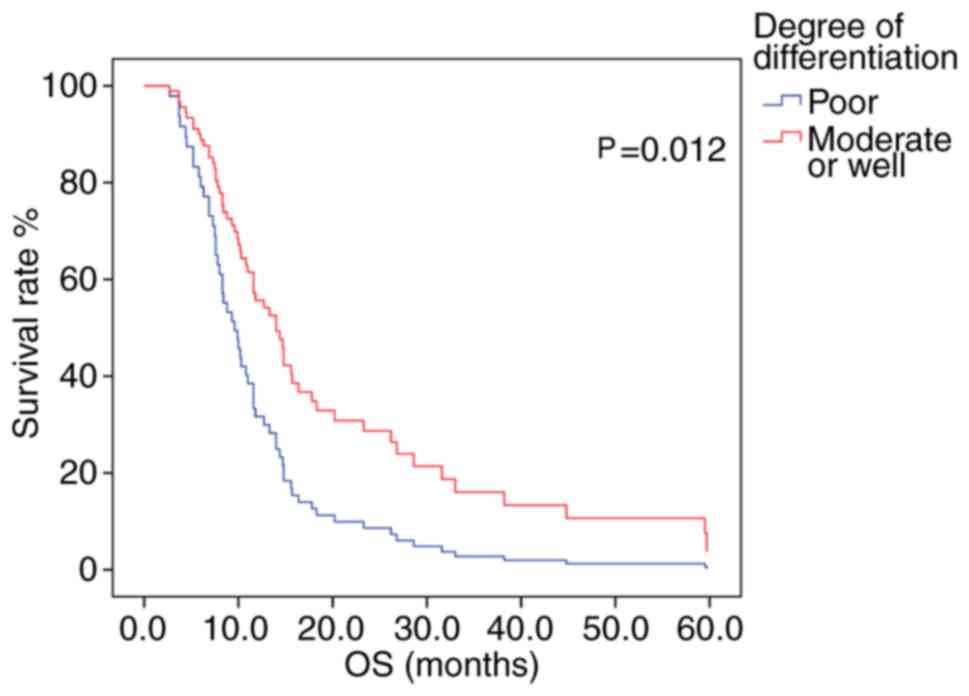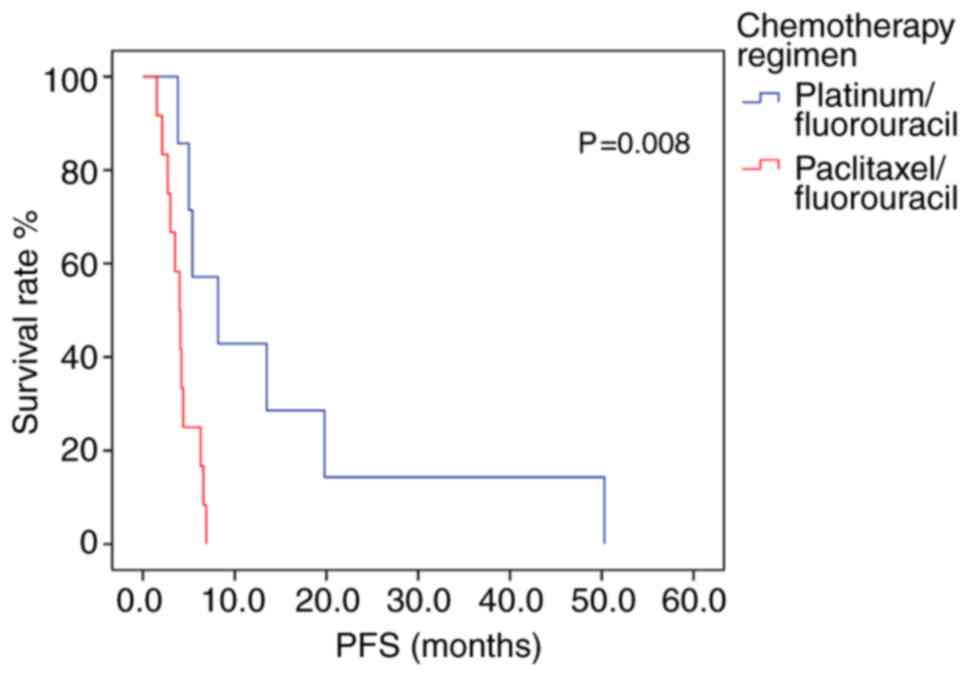|
1
|
Bray F, Ferlay J, Soerjomataram I, Siegel
RL, Torre LA and Jemal A: Global cancer statistics 2018: GLOBOCAN
estimates of incidence and mortality worldwide for 36 cancers in
185 countries. CA Cancer J Clin. 68:394–424. 2018. View Article : Google Scholar : PubMed/NCBI
|
|
2
|
Meyer HJ and Wilke H: Treatment strategies
in gastric cancer. Dtsch Arztebl Int. 108:698–706. 2011.PubMed/NCBI
|
|
3
|
Shitara K: Chemotherapy for advanced
gastric cancer: Future perspective in Japan. Gastric Cancer. 20
(Suppl 1):S102–S110. 2017. View Article : Google Scholar
|
|
4
|
Herman JG and Baylin SB: Gene silencing in
cancer in association with promoter hypermethylation. N Engl J Med.
349:2042–2054. 2003. View Article : Google Scholar : PubMed/NCBI
|
|
5
|
Wilson AS, Power BE and Molloy PL: DNA
hypomethylation and human diseases. Biochim Biophys Acta.
1775:138–162. 2007.PubMed/NCBI
|
|
6
|
Nandakumar V, Vaid M and Katiyar SK:
(−)-Epigallocatechin-3-gallate reactivates silenced tumor
suppressor genes, Cip1/p21 and p16INK4a, by reducing DNA
methylation and increasing histones acetylation in human skin
cancer cells. Carcinogenesis. 32:537–544. 2011. View Article : Google Scholar : PubMed/NCBI
|
|
7
|
Farias N, Ho N, Butler S, Delaney L,
Morrison J, Shahrzad S and Coomber BL: The effects of folic acid on
global DNA methylation and colonosphere formation in colon cancer
cell lines. J Nutr Biochem. 26:818–826. 2015. View Article : Google Scholar : PubMed/NCBI
|
|
8
|
Pan Y, Liu G, Zhou F, Su B and Li Y: DNA
methylation profiles in cancer diagnosis and therapeutics. Clin Exp
Med. 18:1–14. 2018. View Article : Google Scholar : PubMed/NCBI
|
|
9
|
Constantinidou A, Alifieris C and Trafalis
DT: Targeting programmed cell death-1 (PD-1) and ligand (PD-L1): A
new era in cancer active immunotherapy. Pharmacol Ther. 194:84–106.
2019. View Article : Google Scholar : PubMed/NCBI
|
|
10
|
Zhang J, Dang F, Ren J and Wei W:
Biochemical aspects of PD-L1 regulation in cancer immunotherapy.
Trends Biochem Sci. 43:1014–1032. 2018. View Article : Google Scholar : PubMed/NCBI
|
|
11
|
Pilon-Thomas S, Mackay A, Vohra N and Mulé
JJ: Blockade of programmed death ligand 1 enhances the therapeutic
efficacy of combination immunotherapy against melanoma. J Immunol.
184:3442–3449. 2010. View Article : Google Scholar : PubMed/NCBI
|
|
12
|
Rizvi NA, Hellmann MD, Brahmer JR,
Juergens RA, Borghaei H, Gettinger S, Chow LQ, Gerber DE, Laurie
SA, Goldman JW, et al: Nivolumab in combination with platinum-based
doublet chemotherapy for first-line treatment of advanced
non-small-cell lung cancer. J Clin Oncol. 34:2969–2979. 2016.
View Article : Google Scholar : PubMed/NCBI
|
|
13
|
Wang Y, Wu L, Tian C and Zhang Y:
PD-1-PD-L1 immune-checkpoint blockade in malignant lymphomas. Ann
Hematol. 97:229–237. 2018. View Article : Google Scholar : PubMed/NCBI
|
|
14
|
Fromowitz FB, Viola MV, Chao S, Oravez S,
Mishriki Y, Finkel G, Grimson R and Lundy J: Ras p21 expression in
the progression of breast cancer. Hum Pathol. 18:1268–1275. 1987.
View Article : Google Scholar : PubMed/NCBI
|
|
15
|
Samadani AA, Noroollahi SE,
Mansour-Ghanaei F, Rashidy-Pour A, Joukar F and Bandegi AR:
Fluctuations of epigenetic regulations in human gastric
Adenocarcinoma: How does it affect? Biomed Pharmacother.
109:144–156. 2019. View Article : Google Scholar : PubMed/NCBI
|
|
16
|
Li Y, Liang J and Hou P: Hypermethylation
in gastric cancer. Clin Chim Acta. 448:124–132. 2015. View Article : Google Scholar : PubMed/NCBI
|
|
17
|
Dong H, Strome SE, Salomao DR, Tamura H,
Hirano F, Flies DB, Roche PC, Lu J, Zhu G, Tamada K, et al:
Tumor-associated B7-H1 promotes T-cell apoptosis: A potential
mechanism of immune evasion. Nat Med. 8:793–800. 2002. View Article : Google Scholar : PubMed/NCBI
|
|
18
|
Passiglia F, Bronte G, Bazan V, Natoli C,
Rizzo S, Galvano A, Listì A, Cicero G, Rolfo C, Santini D and Russo
A: PD-L1 expression as predictive biomarker in patients with NSCLC:
A pooled analysis. Oncotarget. 7:19738–19747. 2016. View Article : Google Scholar : PubMed/NCBI
|
|
19
|
Koganemaru S, Inoshita N, Miura Y, Miyama
Y, Fukui Y, Ozaki Y, Tomizawa K, Hanaoka Y, Toda S, Suyama K, et
al: Prognostic value of programmed death-ligand 1 expression in
patients with stage III colorectal cancer. Cancer Sci. 108:853–858.
2017. View Article : Google Scholar : PubMed/NCBI
|
|
20
|
Wang C, Zhu H, Zhou Y, Mao F, Lin Y, Pan
B, Zhang X, Xu Q, Huang X and Sun Q: Prognostic value of PD-L1 in
breast cancer: A meta-analysis. Breast J. 23:436–443. 2017.
View Article : Google Scholar : PubMed/NCBI
|
|
21
|
Drakes ML, Mehrotra S, Aldulescu M, Potkul
RK, Liu Y, Grisoli A, Joyce C, O'Brien TE, Stack MS and Stiff PJ:
Stratification of ovarian tumor pathology by expression of
programmed cell death-1 (PD-1) and PD-ligand 1 (PD-L1) in ovarian
cancer. J Ovarian Res. 11:432018. View Article : Google Scholar : PubMed/NCBI
|
|
22
|
Hino R, Kabashima K, Kato Y, Yagi H,
Nakamura M, Honjo T, Okazaki T and Tokura Y: Tumor cell expression
of programmed cell death-1 ligand 1 is a prognostic factor for
malignant melanoma. Cancer. 116:1757–1766. 2010. View Article : Google Scholar : PubMed/NCBI
|
|
23
|
Larsen SK: Cellular immune responses
towards regulatory cells. Dan Med J. 63:B51882016.PubMed/NCBI
|
|
24
|
Sun J, Xu K, Wu C, Wang Y, Hu Y, Zhu Y,
Chen Y, Shi Q, Yu G and Zhang X: PD-L1 expression analysis in
gastric carcinoma tissue and blocking of tumor-associated PD-L1
signaling by two functional monoclonal antibodies. Tissue Antigens.
69:19–27. 2007. View Article : Google Scholar : PubMed/NCBI
|
|
25
|
Jiang D, Xu YY, Li F, Xu B and Zhang XG:
The role of B7-H1 in gastric carcinoma: Clinical significance and
related mechanism. Med Oncol. 31:2682014. View Article : Google Scholar : PubMed/NCBI
|
|
26
|
Qing Y, Li Q, Ren T, Xia W, Peng Y, Liu
GL, Luo H, Yang YX, Dai XY, Zhou SF and Wang D: Upregulation of
PD-L1 and APE1 is associated with tumorigenesis and poor prognosis
of gastric cancer. Drug Des Devel Ther. 9:901–909. 2015. View Article : Google Scholar : PubMed/NCBI
|
|
27
|
Kim JW, Nam KH, Ahn SH, Park DJ, Kim HH,
Kim SH, Chang H, Lee JO, Kim YJ, Lee HS, et al: Prognostic
implications of immunosuppressive protein expression in tumors as
well as immune cell infiltration within the tumor microenvironment
in gastric cancer. Gastric Cancer. 19:42–52. 2016. View Article : Google Scholar : PubMed/NCBI
|
|
28
|
Gevensleben H, Holmes EE, Goltz D,
Dietrich J, Sailer V, Ellinger J, Dietrich D and Kristiansen G:
PD-L1 promoter methylation is a prognostic biomarker for
biochemical recurrence-free survival in prostate cancer patients
following radical prostatectomy. Oncotarget. 7:79943–79955. 2016.
View Article : Google Scholar : PubMed/NCBI
|
|
29
|
Micevic G, Thakral D, McGeary M and
Bosenberg M: PD-L1 methylation regulates PD-L1 expression and is
associated with melanoma survival. Pigment Cell Melanoma Res.
32:435–440. 2019. View Article : Google Scholar : PubMed/NCBI
|
|
30
|
Asgarova A, Asgarov K, Godet Y, Peixoto P,
Nadaradjane A, Boyer-Guittaut M, Galaine J, Guenat D, Mougey V,
Perrard J, et al: PD-L1 expression is regulated by both DNA
methylation and NF-kB during EMT signaling in non-small cell lung
carcinoma. Oncoimmunology. 7:e14231702018. View Article : Google Scholar : PubMed/NCBI
|
|
31
|
Goltz D, Gevensleben H, Dietrich J and
Dietrich D: PD-L1 (CD274) promoter methylation predicts survival in
colorectal cancer patients. Oncoimmunology. 6:e12574542016.
View Article : Google Scholar : PubMed/NCBI
|
|
32
|
Goltz D, Gevensleben H, Grünen S, Dietrich
J, Kristiansen G, Landsberg J and Dietrich D: PD-L1 (CD274)
promoter methylation predicts survival in patients with acute
myeloid leukemia. Leukemia. 31:738–743. 2017. View Article : Google Scholar : PubMed/NCBI
|
|
33
|
Wang FH, Shen L, Li J, Zhou ZW, Liang H,
Zhang XT, Tang L, Xin Y, Jin J, Zhang YJ, et al: The Chinese
society of clinical oncology (CSCO): Clinical guidelines for the
diagnosis and treatment of gastric cancer. Cancer Commun (Lond).
39:102019. View Article : Google Scholar : PubMed/NCBI
|
|
34
|
Kim G, Kim J, Han SY, Hwang IG, Kim HS and
Min H: The effects of BRCA1 expression on the chemosensitivity of
gastric cancer cells to platinum agents. Oncol Lett. 17:5023–5029.
2019.PubMed/NCBI
|
|
35
|
Saal LH, Gruvberger-Saal SK, Persson C,
Lövgren K, Jumppanen M, Staaf J, Jönsson G, Pires MM, Maurer M,
Holm K, et al: Recurrent gross mutations of the PTEN tumor
suppressor gene in breast cancers with deficient DSB repair. Nat
Genet. 40:102–107. 2008. View Article : Google Scholar : PubMed/NCBI
|
|
36
|
Phuah SY, Looi LM, Hassan N, Rhodes A,
Dean S, Taib NA, Yip CH and Teo SH: Triple-negative breast cancer
and PTEN (phosphatase and tensin homologue) loss are predictors of
BRCA1 germline mutations in women with early-onset and familial
breast cancer, but not in women with isolated late-onset breast
cancer. Breast Cancer Res. 14:R1422012. View Article : Google Scholar : PubMed/NCBI
|
|
37
|
Mittendorf EA, Philips AV, Meric-Bernstam
F, Qiao N, Wu Y, Harrington S, Su X, Wang Y, Gonzalez-Angulo AM,
Akcakanat A, et al: PD-L1 expression in triple-negative breast
cancer. Cancer Immunol Res. 2:361–370. 2014. View Article : Google Scholar : PubMed/NCBI
|
|
38
|
Song M, Chen D, Lu B, Wang C, Zhang J,
Huang L, Wang X, Timmons CL, Hu J, Liu B, et al: PTEN loss
increases PD-L1 protein expression and affects the correlation
between PD-L1 expression and clinical parameters in colorectal
cancer. PLoS One. 8:e658212013. View Article : Google Scholar : PubMed/NCBI
|
|
39
|
Zhou Q, Munger ME, Highfill SL, Tolar J,
Weigel BJ, Riddle M, Sharpe AH, Vallera DA, Azuma M, Levine BL, et
al: Program death-1 signaling and regulatory T cells collaborate to
resist the function of adoptively transferred cytotoxic T
lymphocytes in advanced acute myeloid leukemia. Blood.
116:2484–2493. 2010. View Article : Google Scholar : PubMed/NCBI
|
|
40
|
Brahmer JR, Tykodi SS, Chow LQ, Hwu WJ,
Topalian SL, Hwu P, Drake CG, Camacho LH, Kauh J, Odunsi K, et al:
Safety and activity of anti-PD-L1 antibody in patients with
advanced cancer. N Engl J Med. 366:2455–2465. 2012. View Article : Google Scholar : PubMed/NCBI
|
|
41
|
Bang YJ, Kang YK, Catenacci DV, Muro K,
Fuchs CS, Geva R, Hara H, Golan T, Garrido M, Jalal SI, et al:
Pembrolizumab alone or in combination with chemotherapy as
first-line therapy for patients with advanced gastric or
gastroesophageal junction adenocarcinoma: Results from the phase II
nonrandomized KEYNOTE-059 study. Gastric Cancer. 22:828–837. 2019.
View Article : Google Scholar : PubMed/NCBI
|
|
42
|
Fuchs CS, Doi T, Jang RW, Muro K, Satoh T,
Machado M, Sun W, Jalal SI, Shah MA, Metges JP, et al: Safety and
efficacy of pembrolizumab monotherapy in patients with previously
treated advanced gastric and gastroesophageal junction cancer:
Phase 2 Clinical KEYNOTE-059 trial. JAMA Oncol. 4:e1800132018.
View Article : Google Scholar : PubMed/NCBI
|



















